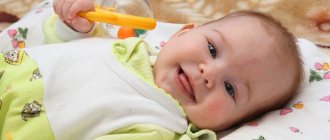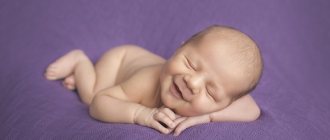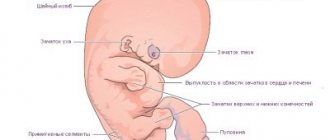Many parents begin to worry when their baby does not wake up from loud noise or is not distracted by external stimuli while awake. In most cases, this is normal and is due to the physiology of the little person.
Hearing test
This may also be due to serious health problems. How many children typically have hearing problems? According to statistics, on average 15 out of 1000 newborns have difficulty hearing the world around them. Some hearing damage is so severe that hearing aids must be purchased.
In this regard, you need to understand when a newborn begins to hear, and what physiological characteristics of hearing a newborn has.
Physiological features
When do newborns develop hearing? In the first 2-3 days after birth, the baby hears almost nothing due to the presence of amniotic fluid in his inner ear. In general, the baby’s ability to recognize sounds is formed in the prenatal period.
In general, the baby does not need absolute silence when falling asleep, since in the mother’s tummy he constantly heard the sounds of surrounding organs. The baby may not respond to fairly strong monotonous noises, but sharp loud sounds can frighten him.
Photo of a newborn
Important! The peculiarity of hearing in a newborn child is that he can hear equally both during sleep and while awake.
At the fourth week of life, the baby becomes able to distinguish some sounds; from 9-12 weeks he begins to understand where they come from and look for the source with his eyes.
At 3 months, the baby can turn his head towards the sound and is able to recognize his mother by her voice. When he hears it, he calms down, and also knows how to understand intonation and listen to the timbre of the voices of different people.
From the first days of life, it is useful to let the baby listen to children's songs, poems, and fairy tales. You can also comment on your actions. Thanks to this, the child will quickly remember the names of objects and their purposes, and such conversations can strengthen the relationship between the child and the mother.
Under mom's control
If audiological screening was not carried out in the maternity hospital for some reason, but you suspect that your child is hard of hearing, check the baby’s hearing at home (no earlier than 5 days after birth). To do this, discreetly clap your hands next to the baby's ear. The sound should not be too loud. Do the test first on the right ear, then on the left ear.
A child’s lack of response to a home hearing test is a reason for an immediate visit to the doctor!
But keep in mind that premature babies' hearing develops later. If your baby was born prematurely, undergo a full examination to rule out pathologies.
The hearing aid develops in such a way that in the first days of life the baby reacts only to certain vibrations and sharp sounds. He does not pay attention to minor noises in a calm environment. By one month, hearing is fully developed. The following signs indicate this:
- The baby begins to hear and recognize some sounds.
- At the end of the second month, he recognizes his mother by ear and gets used to the voices of other loved ones.
- By 4 months, the baby consciously turns its head towards the sound sources.
- By six months, the baby responds to its name and responds in a unique way with movements. He can smile if you talk to him.
Age of first sound heard
When does a child begin to hear? For the first time, the baby becomes able to recognize sounds at 16-17 weeks of pregnancy. By the 20th week, the process of formation of the auditory system is completely completed. From this time on, you can talk to your baby. Some mothers consider this a useless activity, but communication in the womb helps prepare for the birth of a son or daughter.
Daily routine of a 5 month old baby
The fetus is able to understand sounds whose volume exceeds 30 decibels. Of course, amniotic fluid somewhat muffles these sounds, but this does not bother the baby.
Interesting! Best of all, a child in the prenatal period understands low sounds, in particular, male voices. Therefore, it is advisable for the father to communicate with the baby.
How does a newborn react to sound?
A child tries to sit up at 4 months - is it possible?
Parents are most often worried because their reaction to what they hear is significantly different from the child’s. This confuses them.
Is a strong reaction normal?
If a child shudders sharply, this does not mean that there is something wrong with the baby’s psyche. Moreover, this is a sign of normal hearing. After some time, the child gets used to different sources of noise. Up to two months the reactions may be somewhat convulsive, after which they become more orderly. At this stage of development, the baby easily listens to calm speech.
Audio screening of a baby
A particularly strong reaction is normal when the sound is unexpectedly loud or appears suddenly. However, the reactions of babies differ already from the prenatal period. Some children adapt to noise more easily, others have a harder time. You need to gradually accustom your baby to sounds from the very cradle. Can a newborn baby hear quiet sounds? Yes, but does not respond to them.
Normal reactions to sounds in newborns
As soon as the baby's hearing system has adapted to environmental conditions, the child begins to respond to sounds, which sometimes gives parents a new reason for concern. Namely: which reactions are normal and which are not.
The fact is that at first, when the child is already receiving information from the auditory analyzer, but is not yet able to respond to it, his responses may be strange. For example, a reaction to even a quiet, but unexpected sound for a child can be fear and crying.
Also, loud or unexpected noises can cause a convulsive reaction, which, no matter how strange it may look, is normal and allows us to conclude that the hearing aid is developing normally. This just goes to show that babies are extremely sensitive to their environment.
After some time, usually by two months, the baby adapts to the sounds around him and stops reacting so sensitively to them.
Involuntary and convulsive reactions in the first month of life are replaced by voluntary and orderly ones. The baby enjoys listening to speech addressed to him, poetry, rhythmic or classical music. You can see how he tries to find the source of the sound with his eyes.
Hearing test
How much should a baby weigh at 11 months?
How to check a baby's hearing? The first check is carried out in the maternity hospital, but not every institution has the necessary equipment for diagnosis. If the baby has not undergone such an examination, then you need to contact an ENT specialist, otologist or audiologist. For the first time, you need to seek the help of specialists at four months of age; if there are any suspicions, it is better to do it earlier.
To check, a screening analysis is carried out. A special sensor is taken, which is inserted into the child’s ear and produces sounds. The same device has a microphone that analyzes the snail's response. Next, the doctor listens to the received recording and determines whether there is any hearing damage. If it turns out that yes, additional examination is carried out.
Baby listens
Signals of varying intensities are sent to the child's ear to determine the degree of damage to hearing function. The doctor can also use other methods (acoustic impedansometry, tympanometry) to clarify the diagnosis.
Parents can also check their hearing status and must constantly analyze the baby’s reaction to the sounds of the surrounding world. There is no need to be afraid right away, as the baby may be focused on something else. If the lack of response occurs regularly and is not associated with distracted attention, this may indicate a problem.
Baby covers his ears
The parent needs to take the following test and answer some. If the answer to everything was “yes,” then most likely there are no problems with hearing:
- During the first 3 weeks, does your baby startle if he hears an unexpected loud sound?
- When an adult starts talking loudly to a baby before three weeks old, does she flinch?
- When the baby is one month old, can the baby turn his head towards the sound?
- Does a three-month-old baby react to his mother's voice?
- Is a four-month-old baby able to turn his head towards the rattle?
- Does humming begin in a 2-4 month old infant?
- Does a 5 month old baby start babbling?
- Does babbling fill with new sounds at the age of 8-10 months?
- Can a child understand certain words at 9-10 months? For example, such short expressions as mom, dad, bye, give, hello and others like that.
- Is he able to speak the simplest words per year?
Some of the problems described in the last few questions may not be caused solely by hearing problems.
Interesting! Vision and hearing in newborns have different degrees of development. Babies see everything in black and white at a distance of about 20-40 cm, while they hear quite well.
How does a baby hear?
During the first month of development, children are able to hear only loud sounds , but after this period of time, they begin to distinguish and respond to various voices and other extraneous sounds. To understand that your child is beginning to hear well, you should pay attention to the following signs:
- Depending on the speed of speech, the child can behave actively or calmly;
- Intonation - an angry voice can upset the baby, but a gentle one, on the contrary, will calm and delight;
- There is a division into sounds that are liked and those that are not liked.
Often newborn babies can get carried away by one object that makes a pleasant sound for them, for example, a rattle. Then they may stop paying attention to other noises for a while, but this is quite natural and passes quickly.
How do hearing problems manifest themselves?
Doctors distinguish two forms of hearing problems: conductive and sensorineural. The former are caused by problems in the development of the outer or middle ear. As a rule, such disorders are easy to treat. For example, a child may not hear due to wax impaction. This is a very common cause of problems because the external auditory canal is very narrow, so the plug easily blocks the path of sound.
Another special case of conductive disorders is foreign bodies. Therefore, parents should be careful to ensure that babies do not pick up small objects. Hearing problems can also begin after swimming, as well as due to otitis media and damage to the eardrum.
Sensorineural disorders are usually irreversible, since they develop as a result of hereditary diseases, infections during pregnancy, toxicosis, the use of certain types of antibiotics, injuries, prematurity, etc. Modern medicine cannot restore ear function in this case.
When to see a doctor
As soon as doubts arise, it is better to consult a doctor. If hearing impairment occurs, then timely treatment is a guarantee of a good result. Many parents are afraid to see a doctor in case they hear a bad diagnosis. Don't worry, because the news may be much better than the parent expected.
You should see a doctor if your one-year-old child:
- Does not notice that someone is speaking outside the field of vision.
- The baby often asks again.
- The child pays excessive attention to the adult’s facial expressions.
- Turns on the TV very loudly.
- Can't hear voice on phone.
As a rule, the problem is solved by purchasing a high-quality hearing aid. The main thing here is not to waste time. The sooner it is purchased, the better the child will adapt to society.
So, the answer to the question of whether newborn children hear is clear. In the first two or three days - no. Then, if they do not respond to loud noises, the voice of adults, this is a real problem.
At what week after birth does a baby recognize sounds?
A newborn baby's hearing develops quite quickly. Even before birth, children are able to distinguish sounds in their mother’s stomach. This is why doctors often recommend communicating more with their babies during the period of intrauterine development. This helps the child in the future to quickly distinguish the mother’s voice from other sounds around him.
After birth, the baby's ears are filled with a special liquid for about three days, due to which hearing cannot be clear. It is because of this that children initially react only to loud sounds or vibration. Already 3-4 weeks after birth, the child is able to recognize familiar sounds and noises. The reaction is expressed in:
- the ability to fix your gaze on certain objects you like;
- in the careful study of human faces;
- in slight strabismus;
- in looking more closely at black and white pictures than color ones.
Important! If a woman smokes during pregnancy, takes a large number of medications, drinks alcohol, or suffers from a disease such as measles or rubella, then you should pay special attention to the development of the baby’s hearing.











